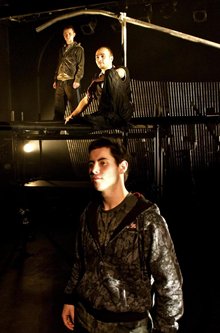What does it mean to be a young man in contemporary Northern Ireland? Or more to the point, what does ‘being a man’ actually mean? In this new piece of verbatim theatre, Tinderbox presents a range of masculinities and diverse experiences of manhood in an attempt to answer such complex questions. Based on forty hours of interviews with young men and women, Sleep Eat Party is made up of dialogues and monologues and focuses on the stories of five young adults, four men and one woman, as they battle to cope with the trials of young adulthood. Gorman’s script raises many issues that are extremely relevant to the lives of young people. Questions relating to gender, sex, sexuality, suicide, drug addiction, and fatherhood are raised throughout, as the production attempts to cram a myriad of topics into a short timeframe.
Strong and consistent performances from this young ensemble cast are to the fore throughout. Shaun Blaney is good as Daniel, the Christian youth struggling with alcoholism, who feels he cannot turn to his parents for help and support. He finds it difficult to balance his religious beliefs with the party culture that surrounds him, and his monologues to the audience seem to serve as a form of therapy. John Travers gives an engaging performance as Terry, the introverted and self-hating young man who cannot come to terms with his sexuality. Terry laments the fact that his father spent little time with him growing up, while his parents – Agnes (Roisin Gallagher) and Aidan (John Shayegh) - question whether their actions have led to Terry’s troubles. Gallagher and Shayegh work well together, creating many poignant moments, from a discussion over lemon drizzle cake to wading through a swimming pool together. Their relationship suggests that it is not only a struggle for the young people experiencing these difficulties, but also for the parents who are watching.
 Shayegh and Gallagher are also skilled in the roles of Ronnie and Shannon, a boyfriend and girlfriend who grapple with Ronnie’s drug addiction. Brian Markey is convincing as the isolated transgendered character Jo, who finds it much easier performing his female identity online rather than in real life. This raises issues regarding the role of modern technology in the lives of young men. In many ways, the internet is a source of liberation, allowing Jo to freely explore his gender in cyberspace before he has the courage to bring it into the real world. Although Shayegh, Gallagher and Markey all play multiple roles and give steady performances, at times it is difficult to distinguish which character they are playing. This leads to some confusion during the production and, as various scenes begin, initially it is difficult to identify the relationships between characters.
Shayegh and Gallagher are also skilled in the roles of Ronnie and Shannon, a boyfriend and girlfriend who grapple with Ronnie’s drug addiction. Brian Markey is convincing as the isolated transgendered character Jo, who finds it much easier performing his female identity online rather than in real life. This raises issues regarding the role of modern technology in the lives of young men. In many ways, the internet is a source of liberation, allowing Jo to freely explore his gender in cyberspace before he has the courage to bring it into the real world. Although Shayegh, Gallagher and Markey all play multiple roles and give steady performances, at times it is difficult to distinguish which character they are playing. This leads to some confusion during the production and, as various scenes begin, initially it is difficult to identify the relationships between characters.
Ciaran Bagnall’s design wonderfully engages with many of the core themes of the production. The wrought iron and twisted bars of the scaffolding which take up most of the stage area, look like they are a cross between a playground climbing-frame and builders’ scaffolding; the characters are caught between childhood and adulthood, a point further reinforced by the "half-way" house in the narrative. At times, director Mike Duke makes good use of the set as the young people simply hang upside down from the bars, emphasising their listlessness within this space. With Duke’s direction and Bagnall’s set and lighting, the production manages to bring the niteclub and party world of Belfast youth culture to life.
However, the drawback to this impressive set is that it blocks the sightlines for some members of the audience. For the majority of the production many of the actors’ faces were obscured by the scaffolding. This is an unfortunate, yet significant, oversight on the part of the director.
Tinderbox has done well to bring the voices and experiences of young men onto the stage using material from interviews with young people. However, this is not enough to sustain the audience’s interest. The production raises issues pertinent to the lives of young men but does not present anything we haven’t heard before. The sweeping survey approach to ‘issues’ in men’s lives fails to explore their circumstances in depth. It provides images of angst-ridden, angry young men who blame the previous generation for their current situations, but does not offer any new insights into this well-trodden terrain.
Pádraic Whyte is a Visiting Research Fellow at the Institute of Irish Studies, Queen’s University, Belfast.